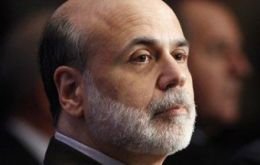MercoPress. South Atlantic News Agency
Economy
-
Wednesday, June 16th 2010 - 04:28 UTC
Argentine minister encouraged with Japanese acceptance of bond-swap

A majority of Japanese investors holding defaulted Argentine debt have exchanged it for new bonds and cash as part of an 18.3 billion US dollars swap that expires June 22, Argentina's finance secretary said on Tuesday.
-
Wednesday, June 16th 2010 - 04:26 UTC
Switzerland closer to handing list of suspected US tax-evaders

Switzerland's parliament has voted to approve a deal which would see information on suspected tax-evaders be passed to US authorities. The Lower House of the Swiss parliament backed the agreement 81 to 61 with 53 abstentions, reversing its earlier decision to reject the agreement last week.
-
Tuesday, June 15th 2010 - 02:36 UTC
EU finance ministers agree on tougher regulation for the hedge fund industry

European Union finance ministers have agreed to introduce tougher regulation of the hedge fund industry. Ministers overrode objections by the new UK government and the City of London, where 80% of European funds are based.
-
Monday, June 14th 2010 - 23:45 UTC
Greek debt downgraded to “junk”; IMF, EU audit finances and budget

Greek government bonds have been downgraded four notches to “junk” status from A3 to Ba1 by Moody's credit rating agency. The agency said Monday there was still “considerable uncertainty” surrounding the impact of measures introduced to cut the country's high budget deficit.
-
Saturday, June 12th 2010 - 04:51 UTC
Uruguay targeting a US dollar at 21/22 Pesos to help exporters

Uruguay will take ‘all the necessary measures’ to target the US dollar at 21/22 Pesos, its equilibrium point to help boost exports, according to Deputy Minister of Economy Pedro Buonomo.
-
Saturday, June 12th 2010 - 04:49 UTC
As US economy picks up, revenue increases and budget deficit drops slightly

The US government posted a smaller budget deficit in May than forecast as a growing economy helped bring in more tax revenue, Treasury Department statistics showed. The excess of spending over revenue fell to 135.9 billion last month from a shortfall of 189.7 billion in May 2009, according to a report issued today in Washington.
-
Friday, June 11th 2010 - 23:20 UTC
Argentine industrial activity soared 13.1% in May and 11.8% in first four months

According to the Argentine Industrial Union, the manufacturing sector grew 13.1% in April in comparison with the same month of 2009, with the automotive and the iron and steel industries as key pillars.
-
Friday, June 11th 2010 - 23:10 UTC
Spanish group Viajes Marsans (former owners of Aerolineas Argentinas) sold

Spanish travel company Viajes Marsans S.A., the parent company of bankrupt airline Air Comet, has been sold to Posibilitum Business for 600 million euros (720 million USD), the parties to the deal said this week.
-
Friday, June 11th 2010 - 20:55 UTC
Positive outlook for the Argentine economy according to international bank

Argentine stocks are poised to a boost from a likely decline in the nation’s credit risk by year-end and the presidential elections in 2011, according to analysts from Spain’s Banco Santander, one of the leading financial institutions in Latinamerica.
-
Friday, June 11th 2010 - 20:53 UTC
Piñera announces huge investments in the state-run copper industry

Chilean President Sebastián Piñera has announced plans to invest 15 billion US dollars in Codelco, the state-owned copper company. Speaking to an audience of workers, managers and executives at a mine in Calama earlier this week, Piñera said the investment would bring about “a renaissance and a new youth to Codelco”.
